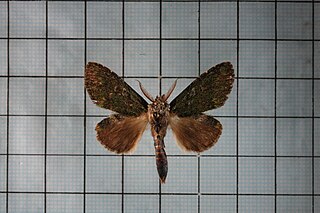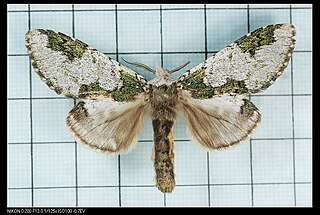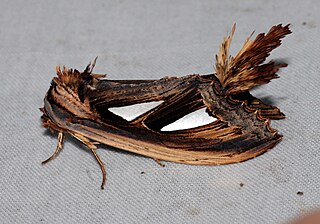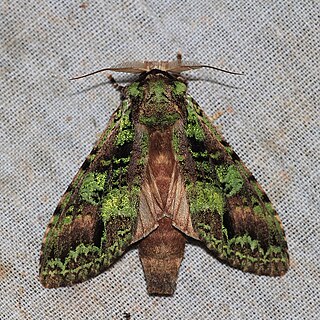
Notodontidae is a family of moths with approximately 3,800 known species. The family was described by James Francis Stephens in 1829. Moths of this family are found in all parts of the world, but they are most concentrated in tropical areas, especially in the New World. The Thaumetopoeidae are sometimes included here as a subfamily.

Stauropus alternus, the lobster caterpillar, lobster moth or crab caterpillar, is a moth of the family Notodontidae. It is found in the north-eastern Himalaya, Sri Lanka, Sundaland, the Philippines, Sulawesi and the southern Moluccas. It was described by Francis Walker in 1855.

Cleptophasia is a monotypic moth genus of the family Notodontidae described by Prout in 1918. It consists of only one species, Cleptophasia scissa, first described by Warren in 1909, which is found in Brazil, French Guiana and Venezuela.
Monocreagra is a genus of moths of the family Notodontidae. It consists of the following species:
Eremonidia is a monotypic moth genus of the family Notodontidae. Its only species, Eremonidia mirifica, is known from two mountain ranges in the south-western part of the Dominican Republic. Both the genus and species were first described by John E. Rawlins and James S. Miller in 2008.

Disphragis is a genus of moths of the family Notodontidae erected by Jacob Hübner in 1820. The genus is confined to the New World and it contains about 137 species.
Ursia is a genus of moths of the family Notodontidae, the prominents. The genus was erected by William Barnes and James Halliday McDunnough in 1911.
Ptilophora ala is a moth of the family Notodontidae. It is known from Shaanxi and Sichuan in China.
Ptilophora horieaurea is a moth of the family Notodontidae. It is known from Sichuan in China.
Ptilophora rufula is a moth of the family Notodontidae. It is known from Taiwan.

Syntypistis viridipicta is a species of moth of the family Notodontidae first described by Wileman in 1910. It is found in northern India, Sundaland, China, Taiwan, Myanmar, Thailand, Vietnam, Nepal, Laos and Cambodia.

Syntypistis comatus is a species of moth of the family Notodontidae first described by John Henry Leech in 1898. It is found in China, Taiwan, India, Myanmar, Thailand, Vietnam, Malaysia, Indonesia the Philippines and New Guinea.

Tarsolepis is a genus of moths in the family Notodontidae erected by Arthur Gardiner Butler in 1872.

Somera is a genus of moths of the family Notodontidae. The genus was erected by Francis Walker in 1855.

Dunama is a genus of moths of the family Notodontidae described by William Schaus in 1912.
Dicentria is a genus of moths of the family Notodontidae. The genus contains about 46 described species occurring from Mexico south to Bolivia and Paraguay. Its affinities to the North American genera Schizura and Oligocentria are not fully understood.
Meragisa is a genus of moths of the family Notodontidae. The genus contains about 45 species, distributed from Mexico south to Bolivia and Brazil.
Urgedra is a genus of moths of the family Notodontidae. The genus contains about 20 described species occurring from Colombia south to Bolivia.

Oxoia is a genus of moths in the family Notodontidae described by Sergius G. Kiriakoff in 1967. Three species are known.
This page is based on this
Wikipedia article Text is available under the
CC BY-SA 4.0 license; additional terms may apply.
Images, videos and audio are available under their respective licenses.










